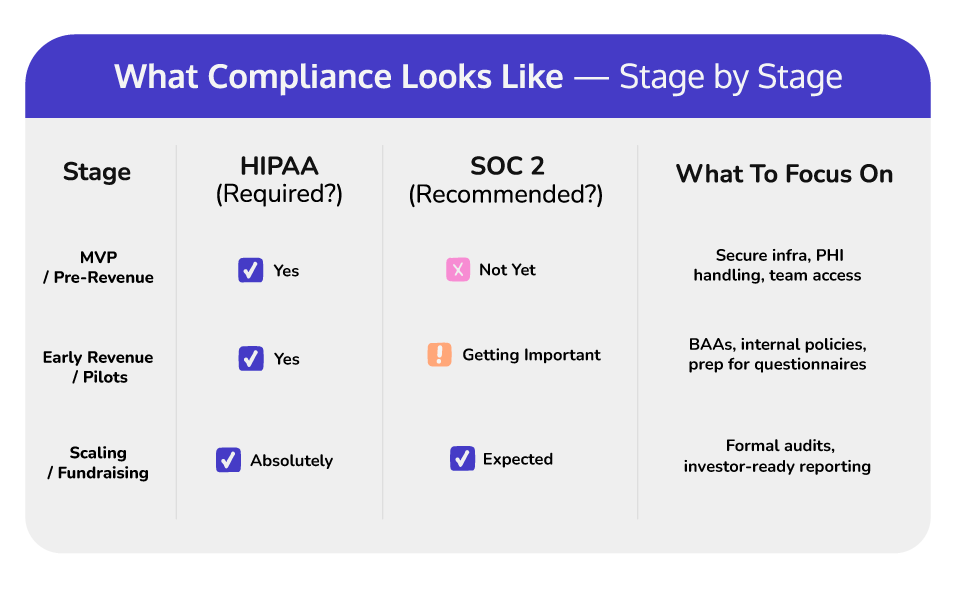If you’ve spent five minutes with any healthtech founder, you’ve probably heard it:
“Which compliance framework am I supposed to worry about first?”
HIPAA, SOC 2, GDPR, HITRUST—it’s acronym soup. And for early-stage founders, sorting out what’s urgent versus what can wait isn’t just helpful—it can be the difference between building trust or burning it before revenue even arrives.
Below, we break down which frameworks matter (and when), how to sidestep costly distractions, and how founders can confidently prioritize security, trust, and growth at every stage.
Why Compliance Matters (and Why It’s More Human Than You Think)
It’s easy to see compliance as a legal box to check—but at its best, it’s about protecting real people: patients, clinicians, and the deeply sensitive data they entrust you with.
For early-stage founders, understanding compliance isn’t just about legal checklists. It’s a signal—to partners, users, and investors—that you care about doing things right.
Quick Definitions: HIPAA vs. SOC 2
- HIPAA (HHS.gov): The Health Insurance Portability and Accountability Act governs how protected health information (PHI) is stored, transmitted, and accessed in the U.S. HIPAA is a legal requirement for nearly all digital health products that touch patient data.
- SOC 2 (AICPA.org): A voluntary security framework used across industries to show your team follows rigorous data security, availability, and privacy practices. Especially relevant if you’re selling into health systems or enterprise customers.
The Big Question: “Which Do I Actually Need—And When?”

Let’s break it down by startup stage:
Pre-Revenue or MVP Stage
HIPAA:
If your product, prototype, or backend touches PHI—even during pilot testing—you must be functionally HIPAA-compliant. That means:
- Encrypted data storage and transmission
- Secure authentication and access controls
- Role-based permissions
- Logging and monitoring of access
- A written plan for how you handle and protect PHI
SOC 2:
- Not needed at this stage unless you’re targeting large enterprise deals (unusual at MVP). Save the budget.
Others (GDPR, HITRUST, etc.):
- Only worry about GDPR if you’re targeting European markets early.
- Only consider HITRUST if you’re planning to sell into pharma.
Post-Pilot, Early Revenue, or Traction Stage
HIPAA:
- Time to strengthen. Audit your internal processes. Use Business Associate Agreements (BAAs). Educate your team on handling PHI.
- Make sure any third-party services are covered under HIPAA too.
SOC 2:
- If you’re pitching to payers or hospital systems, start SOC 2 prep now. It can take months to complete and might be the make-or-break in a security review.
Preparing for Funding or Scaling
HIPAA:
- Investors will expect solid compliance. That includes clear technical controls, privacy policies, and audit readiness.
SOC 2:
- Often required now—especially in the U.S. and EU. A SOC 2 report is seen as a trust signal: that your team can scale responsibly and securely.
Your Compliance Priority Stack (Skip or Double Down?)
Must-Haves From Day 1:
- HIPAA-compliant design (encryption, access controls, audit logging)
- Secure infrastructure (don’t DIY this without guidance)
- Transparent privacy and data use policies
- Signed BAAs with all relevant vendors
Time for SOC 2?
- Start prep when enterprise deals are in sight
- Use tools like Vanta or Drata to manage documentation and evidence
- Train your team—most breaches happen through human error, not code
What You Can Skip (for Now):
- HITRUST or ISO audits (unless a specific customer mandates them)
- Formal HIPAA audit pre-revenue (internal checklist is fine)
- Chasing acronyms you can’t explain to your own team

Red Flags to Avoid
- Buying a compliance tool without understanding what you actually need
- Assuming your dev shop or cloud provider makes you “compliant by default”
- Launching pilots that involve PHI without encryption or access logging
- Ignoring security because “you’re not storing real data yet”—test data leaks too
Pro Tips for Founders
- Pitch compliance as a product feature. Show customers how you protect them.
- Document everything, even informal workflows—investors love audit readiness.
- Be transparent about what data you collect and how it’s used.
- Choose partners who take compliance seriously—don’t optimize only for cost.
The Alternova Take
At Alternova, we help healthtech teams build trust with security baked in—without fear-mongering or over-engineering. We focus on what’s actually needed:- HIPAA-first infrastructure from Day 1
- Clear, realistic paths to SOC 2 readiness
- Human-centered, simple processes that scale with you

